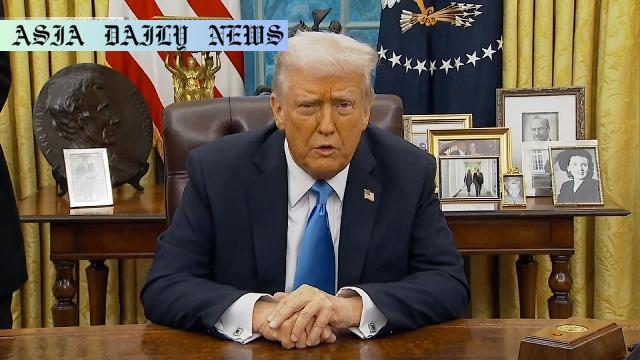Currency policy: Trump criticizes Japan and China for pursuing weak currencies to gain an export advantage.

Trump Criticizes Japan’s Currency Policy
On Wednesday, U.S. President Donald Trump once again voiced his concerns about Japan’s approach to its currency policy. At a White House press event, he focused his criticism on what he describes as Tokyo’s deliberate effort to maintain a weak yen. According to Trump, this practice undermines the competitiveness of U.S. exports, citing specific industries such as agriculture and manufacturing.
When prompted by a question on the decline in international travel to the United States, Trump suggested a rising U.S. dollar as one of the core reasons. As the dollar strengthens, U.S. goods and tourism become less attractive to international consumers. He claimed that countries such as China and Japan maintain depreciated currencies to gain an unfair advantage in the global market, further straining the U.S. economy.
Trump’s Historical Discontent with Japan’s Yen Policy
The President elaborated on his dissatisfaction with Japan, recalling a conversation with former Japanese Prime Minister Abe Shinzo during his first term. He reportedly urged Abe to ensure the yen would not depreciate further, stating that such policies hindered U.S. export-driven industries. Trump, a long-time critic of currency manipulation practices, believes that countries engaging in such tactics weaken the global economy and destabilize fair trade.
Trump’s remarks are a continuation of an ongoing narrative. He has consistently accused Japan and China of undermining their currencies to bolster their export-driven economies. While these claims resonate with Trump’s America-first agenda, critics argue that such assertions lack nuanced economic analysis and fail to address complexities in foreign exchange markets.
Upcoming Japan-U.S. Talks as Exchange Rates Take Center Stage
On Thursday, Japan’s Finance Minister Kato Katsunobu is set to meet U.S. Treasury Secretary Scott Bessent in Washington, where exchange rates are expected to be a prominent discussion topic. The timing of the meeting underscores the importance of currency policy in U.S.-Japan relations. Trump’s comments may amplify the stakes, suggesting potential friction in bilateral trade discussions.
The yen’s valuation impacts not only export dynamics but also global financial markets. A weaker yen might support Japanese exporters, but it creates challenges for American companies reliant on similar markets. Issues like this highlight the need for balanced international currency regulations, ensuring all nations participate equitably in trade.
Broader Implications of Currency Disputes
Trump’s stance reflects broader concerns about the role of exchange rates in fostering or hindering global economic collaboration. Critics warn that currency disputes can spark trade wars, destabilizing multinational relationships and hurting ordinary consumers worldwide. Nations accused of manipulation often argue that their policies are necessary responses to domestic economic needs or global market forces beyond their control.
As global economies grow increasingly interconnected, the international community must address currency valuation disputes in a cooperative manner. Economic discourse and transparent policies can pave the way for equitable economic growth, avoiding unilateral accusations or retaliatory measures.
For now, Trump’s pointed commentary on Japan’s currency approach and the yen’s depreciation adds another layer to the U.S.-Japan economic relationship, potentially influencing ongoing talks and future trade agreements. By emphasizing the importance of fair trade and balanced monetary policies, the two nations have an opportunity to strengthen their partnership.
Commentary
Trump’s Comments Highlight a Polarized Debate
President Trump’s remarks on Japan’s currency policy renew a contentious debate about how nations manage their economies in a globalized world. Trump’s accusations might resonate with domestic audiences keen on protecting American industries, but they also oversimplify a complex issue. Currency markets are influenced by myriad factors, including government policy, market forces, and broader economic conditions.
For years, critics of Japan and China have pointed to perceived currency manipulation as a deliberate move to make their goods more competitive on the global market. Trump’s articulation of these grievances underscores an ongoing reality: managing global currency politics is an arduous task for policymakers. An overly strong dollar may hurt U.S. exports, but labeling monetary practices abroad as “unfair” risks alienating international partners.
Balancing Geopolitical Interests with Domestic Industry
Trump’s long-standing critique of Japan’s yen policy reflects his broader America-first priorities. While it’s natural for any leader to defend their domestic industries, effective diplomacy requires nuance and collaboration. Industrial challenges like declining competitiveness in sectors such as farming and tourism deserve attention, but solutions often lie in innovative, cooperative policies rather than unilateral criticism of trading partners.
The yen, like any currency, holds reciprocal implications. While a weaker yen benefits Japan’s exporters, it also presents challenges for Japanese companies dependent on imported goods. Policymakers must approach such issues holistically, balancing domestic imperatives with international considerations.
A Call for Constructive Dialogue
Ultimately, Trump’s critique underscores the need for global dialogue and transparent economic policies. The upcoming meeting between Japan’s Finance Minister and the U.S. Treasury Secretary provides an opportunity for meaningful discussion about exchange rates and fair trade practices. Such conversations are critical for fostering trust and avoiding counterproductive tensions.
As global challenges grow, fostering an inclusive, forward-thinking approach is essential for achieving sustainability and prosperity. Rather than focusing solely on assigning blame, stakeholders must collaborate to create equitable solutions that respect all nations’ economic dynamics and global economic stability.


